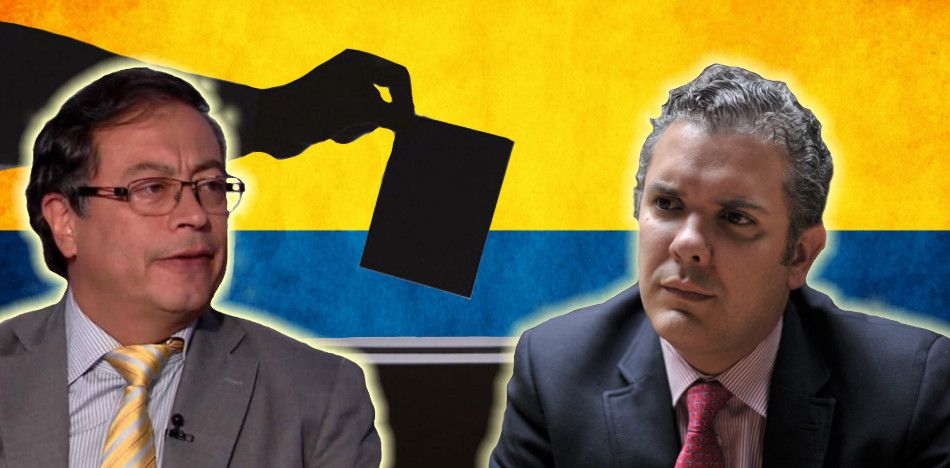
The latest poll conducted by the survey company Guarumo, which measures the intention to vote in Colombia, revealed a technical tie between Iván Duque and Gustavo Petro for the presidential elections in May. Duque’s support increased to 23.6%, while Petro’s remains at 23.1%.
Duque celebrated reaching first place in the survey, and said he would continue working to win on the center-right party primaries on March 11 and the presidential elections.
“When we do well in the polls, we work three times harder, when we do poorly we work three times harder, and when we remain steady keep working three times harder,” said Duque.
The rise of Duque
Despite leading the intention to vote polls in the country, Duque still has a big obstacle to overcome. On March 11 he will compete against his other center-right counterparts, Marta Lucía Ramírez and Alejandro Ordoñez. This encounter will determine who will represent the right-wing political coalition in the country. It is an effort led by the former presidents Pastrana and Uribe to consolidate forces in order to avoid a government linked to socialism.
The Center for Analysis and Public Affairs and pollster Sociométrica joined together to build the Electoral Aggregate Index for Electoral Preferences (IAPE). Its purpose is to unite the different known election surveys in a single graph.
According to the IAPE, between July 2017 and February 2018, all the surveys (except CNC and Yanhaas in January 2018) recorded a sustained increase for the Democratic Center party candidate, Duque. This led the “uribista” candidate to move up and establish an upward trend line in the survey graph.
IAPE: El resultado de cruzar todas las encuestas presidenciales https://t.co/2V1D1GRPo1 pic.twitter.com/4MO6ywwckB
— CNC (@CNCSocial) March 5, 2018
Polls: Democratic Center and Humane Colombia parties
With the slogan of “governing for all”, Duque has increasingly garnered support among former president Uribe’s followers. The message has yet to convince the broader Uribe-supporter base, who fear he’ll end up being like Juan Manuel Santos, who changed his political stripes rapidly after becoming president, and moved away from the “uribista” camp.
However, Duque’s growing political backing confirms that Uribes’ followers are closing their ranks. Proof of this is that the ex-governor of Antioquia, Luis Alfredo Ramos, joined Duque’s campaign, as Head of National Debate.
Con todo entusiasmo y convicción me integro a la campaña Presidencial de Iván Duque como Jefe de Debate Nacional. Los invito a que trabajemos juntos para cambiar el rumbo del País.
— Luis Alfredo Ramos (@LuisAlfreRamos) February 27, 2018
Tweet: With total enthusiasm and conviction, I join the Presidential campaign of Iván Duque as Head of National Debate. I invite you to work together with us to change the course of the Country.
Ramos is confident, predicting Duque’s victory in the center-right party elections, saying in his closing campaign speech that they are “seven days away from victory”.
For the left-wing coalition, presidential pre-candidates will also be decided on March 11. Bogota’s former mayor Gustavo Petro, representing Colombia Humana party, will face former Governor Carlos Caicedo of Fuerza Ciudadana. According to the survey, Caicedo has no margin to ensure his presidential candidacy, with only 10.1% support compared to Petro’s 89.9%.
Polarization in the voting public
Colombian’s remain undecided, although the data available highlights Duque and Petro as the most probable contenders. Many of the country’s citizens consider themselves centrists. Faced with the candidates available, many have said they would vote ‘null’, as has been pointed out by the Political Culture Survey DANE, or the AmericasBarometer.
The left, led by Petro, claims the opposition has orchestrated attacks against him and is involved in a propaganda effort against his campaign with the aim of sowing fear amongst voters.
On the other hand, the candidates of the center-right label Petro as the Colombian Chavez, and claim he has the characteristics of someone who could install an authoritarian-like regime within Colombia (Castro-chavismo).
Despite past popularity, leftist Sergio Fajardo fell to the third position with 8.1% of support. His flexibility and lack of concreteness in front of many issues took its toll on the last election surveys. Last week, he named Claudia Lopez as his candidate for vicepresident.
Right-wing coalition candidate Marta Lucía Ramírez holds the fifth position with 5.7% of the national polls. Within her coalition she holds second place, coming in after Duque, with 21.7%. Meanwhile, the candidate for La Patria de Pie, Alejandro Ordóñez, only reached 6 %.
Legislative support for the candidates
If Duque were to arrive at the presidency, he would have a large bench of Uribe’s supporters in Congress, as revealed by the Guarumo survey. If the Senate elections were tomorrow, the Democratic Center would be the clear winner and could claim twenty of the one hundred seats. According to the measurement of the intention of vote for the Senate, the party of former President Uribe would obtain 20.1% of the votes, which is the largest voting force in the House.
Petro would not command the same kind of support. The same survey indicates that his bench called the “Decency List” would reach only 1%. If Petro became president, it would be quite difficult to govern with Congress against him.
The legislative elections are a harbinger of legislative support for presidential policies. Without significant support there, presidential priorities would remain little more than campaign promises.
 Versión Español
Versión Español












